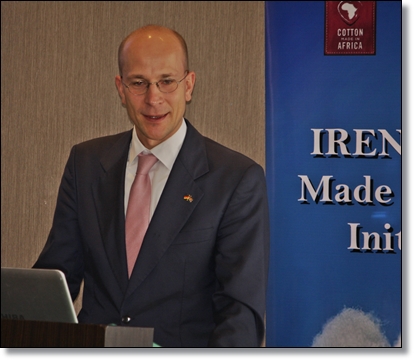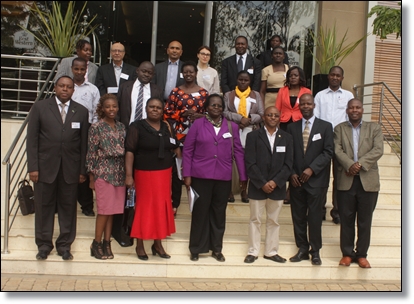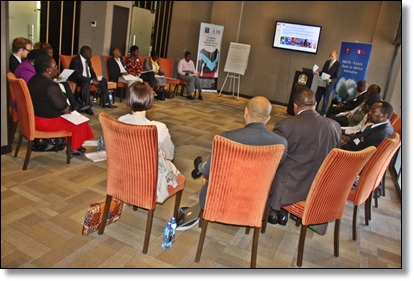Domestic Textile Market Activation in East Africa
 |
|
H.E. Andreas Peschke, German Ambassador in Kenya makes his remarks during the IREN-CmiA Domestic Textile Market Activation in East Africa forum. |
We are all aware of the importance of cotton for many African countries. It is not only the basic source of income for almost 20 million farmers and their families, but is also the basis for further added value in Africa. However, as a commodity cotton is exposed to changing world market prices. Subsidies by major cotton producing countries like the US, China and India keep the supply of cotton artificially high and pressure on cotton prices. The ones suffering most from such market distortion are African smallholder farmers.
The German Government strongly supported the initiative to abolish direct and indirect subsidies to cotton farmers that was brought forward by the so-called C4 countries, namely Benin, Burkina Faso, Mali and Chad, at the 2003 Cancun WTO negotiations. Together with a number of our EU partners, we initiated the EU Africa Partnership for Cotton. Unfortunately, no real progress has been realized in the WTO talks. Significant subsidies continue to be paid, especially when cotton world market prices are rather low, as is the case today.
In this context, the ‘Cotton made in Africa’ (CmiA) initiative was launched by the German entrepreneur Dr. Michael Otto in cooperation with the German Government via the Ministry for Economic Cooperation and Development in 2005. This initiative tries to answer two challenges: On the one side, consumers all over the world are becoming more and more interested in the conditions under which products they buy are grown or fabricated. On the other side, it was essential to find alternative ways to increase the income and improve livelihoods of smallholder cotton farmers.
 |
| IREN-CmiA Forum delegates |
Therefore, initiatives like ‘Cotton made in Africa’ aim at creating socially and ecologically acceptable conditions for smallholder cotton farming and to help smallholder farmers to increase their income. At the same time, it makes it possible for textile businesses to show the cotton they use is produced under dignified conditions. Today, cotton, verified according to these standards, already has a 9% share of the world-wide trade, and this figure is due to increase. Although other commodities like coffee and fish already have a higher ‘verified’ market share (15%), the cotton sustainability initiatives started later and the textile value chain, in comparison, is quite complex. So, the potential for initiatives like Cotton Made in Africa is high and can create more business opportunities in Africa in the future.
The German Government supports the Cotton Made in Africa Initiative by supporting the ‘Aid by Trade Foundation’ based in Hamburg. This is a strategic alliance supporting projects in Côte d’Ivoire, Burkina Faso, Benin, Malawi, Mozambique, Zambia and others, in order to create a transparent value chain and to increase demand for cotton made in Africa. However, East Africa is missing so far.
I hope this can be changed. East Africa should be part of the value chain and the trademark “Cotton Made in Africa” and I am thankful to James Shikwati for moving forward this initiative. He is a member of the board of trustees of the Aid by Trade Foundation, and he came up with the idea to assess the opportunities in East Africa. The forum today is a step in this direction. We are also grateful to the Bill and Melinda Gates Foundation for supporting this initiative in East Africa.
 |
| IREN-CmiA forum in progress |
Let me finish by highlighting some key projects of German Development Cooperation in Kenya that are linked to the discussion we have today. Agriculture, food security and drought resilience is one big priority area of our joint cooperation. We mostly work in Western and Northern Kenya. Enabling farmers and pastoralists to produce more food, for themselves and for the markets, is one of the keys to fight food scarcity and hunger. The focus of our support is, among other things, on smallholder irrigation, rural roads and market infrastructure, training and extension services for farmers. Linkages to cotton can easily be made, as we know from other countries. Farmers can use these services. They can use the advice and the investments in these areas, for producing food and cultivating cotton at the same time.
There are opportunities for a partnership between Germany and the European Union, and the East African cotton and textile sectors, although it will be a long and ambitious way to create a label and value chain ‘Cotton Made in East Africa.’ I hope that we can all get a better understanding of the opportunities and challenges.
By H.E. Andreas Peschke
German Ambassador in Kenya
